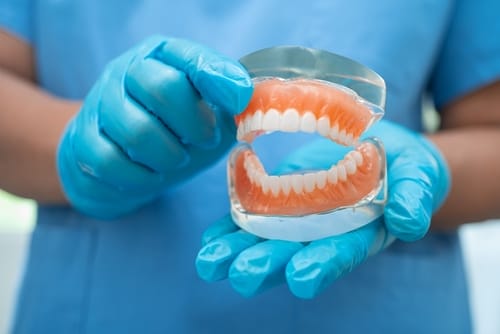Missing natural teeth can greatly affect your oral health and how you live your life. It may make it hard for you to chew or speak. It can also harm your self-confidence. Dentures are a helpful way to solve these issues. They can restore your ability to eat and speak while giving you back your smile.
Dentures are specially-made devices that replace missing teeth. They can improve your oral health by helping with your bite and stopping more tooth loss. Dentures also help keep your face’s shape and improve your look by filling in your smile.
Defining Dentures: Types and Uses
Dentures come in various types tailored to specific needs. Understanding these differences can help you select the right option for your oral health.
Complete dentures, or full dentures, are for when all natural teeth are missing in the upper or lower jaw. They are designed to fit snugly over the gums, providing a complete set of artificial teeth. On the other hand, partial dentures blend with your natural teeth to fill gaps in your smile.
Immediate dentures are inserted immediately after natural teeth removal, allowing you to have teeth during the healing process. These dentures may require more adjustments as your gums heal and could serve as a temporary solution until you receive standard dentures.
The Role of Dentures in Oral Health and Aesthetics
New dentures are essential for good oral health. They distribute forces when you bite and chew, protecting your teeth and jaw. They enhance your appearance by restoring your smile, supporting facial features affected by tooth loss, and boosting self-confidence during everyday activities like eating and talking.
Choosing the Right Type of Dentures for You
Choosing the right denture is crucial for your oral health. Consider factors like the number of missing teeth, gum, and jawbone health, and personal preferences.
For full tooth loss, opt for full dentures; for some remaining natural teeth, choose partial dentures. Alternatively, consider implant-supported dentures for improved stability and a natural feel.
Implant-Supported Dentures: An Overview
Implant-supported dentures are becoming more popular because they have some great benefits. In this method, dental implants are placed into the jawbone. They work like strong anchors for the dentures.
Dental implants are usually made of titanium. They grow together with the jawbone over time. This creates a strong base for the dentures to attach. This way, the dentures fit securely and comfortably. There is no slipping or movement like you might find with traditional dentures.
Implant-supported dentures have clear benefits. They provide a good fit, better chewing power, and feel more natural. They also help with bone health by stopping bone loss that can happen after tooth loss.
The Process of Getting Dentures
The process of getting dentures typically begins with your dentist taking precise measurements of your mouth and creating a customized stone model. This model serves as the basis for crafting your dentures, ensuring a good fit and proper alignment. In cases where extractions are necessary due to tooth loss, your dentist will advise you on the best approach before fitting your new dentures. Following post-extraction care guidelines is crucial to promote healing and prepare for the denture fitting. This process ensures that your new dentures will seamlessly provide functionality and aesthetics, giving you a confident smile.
Daily Life with Dentures
Adjusting to life with dentures may take some time, but with proper care and practice, they can seamlessly integrate into your daily routine. Most wearers quickly adapt to eating, speaking, and performing daily tasks without difficulty. Regular cleaning, gentle handling, and routine dental check-ups are crucial for maintaining the longevity of your dentures and good oral health.
Eating and Speaking with Dentures
Eating and speaking with dentures may feel strange initially, but with practice, you’ll regain confidence. Start with soft foods cut into small pieces and gradually introduce harder foods. Chew slowly on both sides of your mouth and avoid sticky or hard foods to prevent damage.
Practice speaking clearly by reading aloud or engaging in conversations to get used to dentures. If certain words are challenging, focus on practicing sounds.
Maintaining Your Dentures for Longevity
Maintaining dentures is vital for keeping them clean and for oral health. Just like natural teeth, dentures need regular cleaning. This helps remove food bits, plaque, and bacteria. It also stops stains and bad breath.
Cleaning your dentures regularly helps them keep their shape and fit. This ensures they stay comfortable and work well for a long time. Remember, taking care of your dentures helps your oral health and overall well-being.
Cleaning and Care Routines for Denture Longevity
To prolong denture longevity, establish proper cleaning routines. Remove and brush them regularly with a denture cleanser to prevent plaque, stains, and odor. Store them in water or a cleaning solution when not in use to prevent warping. Handle them carefully over soft surfaces to avoid breakage. Address any irritation promptly with your dentist for optimal maintenance.
When to Seek Professional Denture Repair
Regular care is crucial for denture health. For repairs, consult a dentist to prevent issues and prolong their lifespan. Avoid DIY fixes as they may cause more damage. Routine dental check-ups are essential for maintenance, identifying fitting issues, cracks, or wear, and ensuring oral health.
Oral Health with Dentures
Maintaining good oral health is crucial, even with dentures. Care for your gums, tongue, and any remaining teeth to prevent gum disease and other issues. Brush your gums, tongue, and palate daily to remove food particles and enhance blood flow. Clean remaining teeth well, especially around clasps, if you have partial dentures to prevent tooth decay. Good oral hygiene and regular dental check-ups are essential for overall health and well-being.
Ensuring Healthy Gums with Dentures
Wearing dentures requires gum care for comfort and overall mouth health. Healthy gums are essential for denture wearers to keep dentures secure and prevent discomfort.
Regularly massaging your gums improves blood flow and maintains healthy tissues. Gently rub your gums with a soft toothbrush or clean finger. Rinsing your mouth with warm salt water acts as a natural cleanser and reduces inflammation.
If you experience persistent soreness, redness, or swelling in your gums, consult your dentist promptly. These may indicate underlying problems.
Regular Dental Check-Ups
Regular dental check-ups are essential for people who wear dentures. These visits help keep the remaining natural teeth and gums healthy. During your check-up, the dentist will check how well your dentures fit. They will also look for any signs of gum disease or irritation. Your dentist can give you advice on the proper care for your dentures. It is a good idea to see your dentist at least once a year. This way, you can take care of any problems early and keep your oral health in good shape. Regular check-ups help prevent issues and ensure your dentures fit well and work properly.
Schedule Your Appointment Today
If you’re interested in getting dentures, contact Creekside Family Dental to set up an appointment. Our specialists are here to help you achieve your perfect smile.


 Meet Dr. Leffler
Meet Dr. Leffler
 Meet the Team
Meet the Team
 Dental Membership Plan
Dental Membership Plan
 Insurance Information
Insurance Information
 Patient Forms
Patient Forms
 Online Bill Pay
Online Bill Pay
 Your First Visit
Your First Visit





